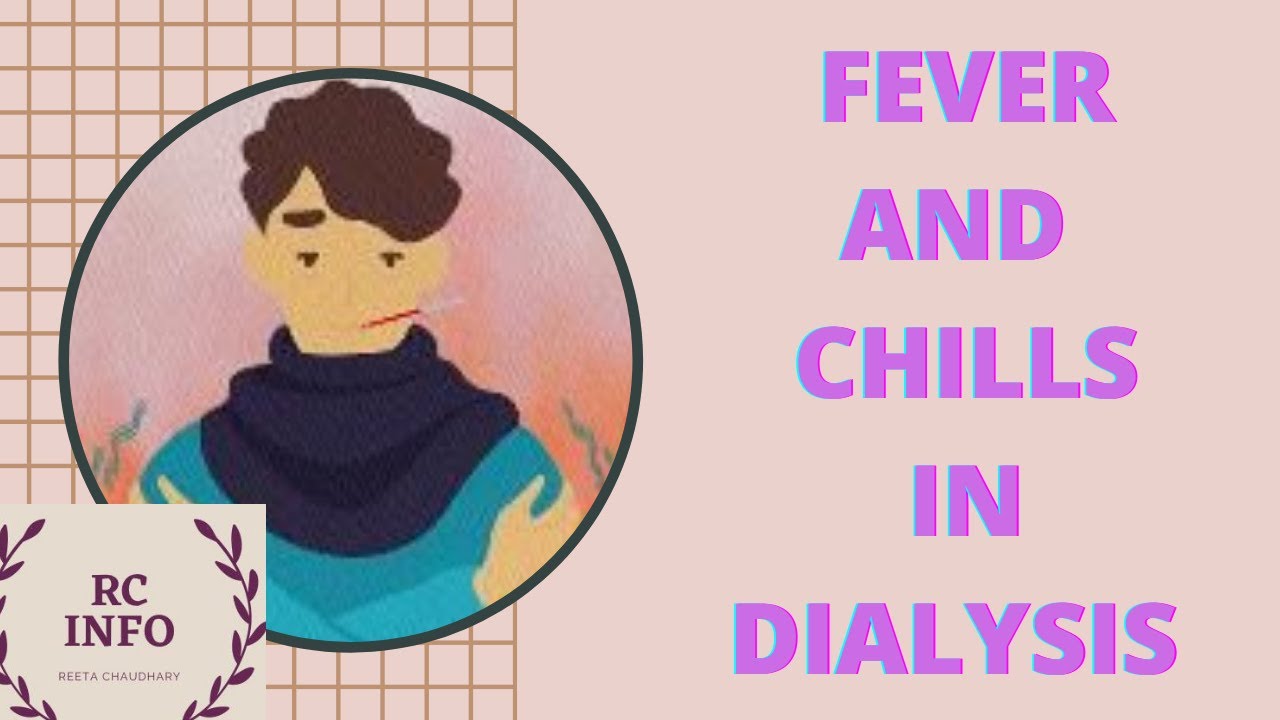Causes Of Fever In Dialysis Patients And Its Treatment - A Condition That Can Be Cured
Many patients undergoing dialysis experience fever for reasons that are not fully understood. This fever can evolve and it can cause patients to develop dangerous illnesses which can lead them to death. In this instance, professionals prescribe necessary treatments to lessen the fever and see what the cause of the fever is that occurs. In this article, we'll go over the causes of fever in dialysis patients and its treatments.
Author:Suleman ShahReviewer:Han JuAug 19, 20220 Shares491 Views

Many patients undergoing dialysis experience fever for reasons that are not fully understood.
This fever can evolve and it can cause patients to develop dangerous illnesses which can lead them to death.
In this instance, professionals prescribe necessary treatments to lessen the fever and see what the cause of the fever is that occurs.
In this article, we'll go over the causes of fever in dialysis patients and its treatments.
Why Do Doctors Recommend Dialysis And Why Patients Get Fever?
When people start to experience symptoms of kidney failure, the majority of them either start dialysis or get a kidney transplant.
Symptoms of kidney failure, difficulties in maintaining blood pressure control, difficulties in maintaining fluid balance, and nutritional issues are some of the factors that provide doctors with guidelines for determining when to begin dialysis.
“„As infections are the second most common cause of death in patients undergoing dialysis, there is interest in clinical dealing with renal diseases in the causes and management of fever in patients with renal failure and dialysis who are especially susceptible to various infections.
According to J. Evers, the causes of fever are these:
- Bronchopulmonary infections
- Pyelonephrhic infections
- Access infections
- Neoplastic
- Vasculitic
- Various
- Unexplained
Is Fever A Side Effect Of Dialysis?
People who receive hemodialysis are at a higher risk of developing sepsis than those who do not (blood poisoning).
This is the point at which bacteria enter the body and begin to spread through the blood, which may eventually result in the failure of multiple organs.
Some of the warning symptoms are feeling faint and having a high temperature.
Big Three Causes Of Fever
There are three different types of infections that are the most common causes of fever in dialysis patients:
- Bronchopulmonary system infections.
- Urinary tract infections.
- Access-related infections.
These big three make up the vast majority of the causes of fever in patients undergoing dialysis.
After the placement of a vascular prosthesis or a central venous dialysis catheter, the risk of access site infection is highest during the first few weeks or months after the procedure.
Urinary tract infections are more common in patients who have an abnormality of the urinary tract or polycystic kidneys.
Bronchopulmonary infections are most likely to occur in elderly patients who have only a slight cough or who are in a mildly confused state.
Patients on long-term dialysis are more likely to develop bronchopulmonary infections.
Patients who are receiving routine dialysis treatments will almost never display symptoms of a fictitious fever.
There may be specific events of exotic diseases, such as brucellosis, in patients undergoing dialysis' however, in most cases, the fever is due to a familiar condition that has been disguised.
Is It Possible To Cure Fever In Dialysis?
In most cases, the differential diagnosis of fever in dialysis patients can be removed through the use of a patient's medical historyand a clinical examination, as well as more straightforward diagnostic procedures.
Approach Fever With These Procedures
Have more straightforward diagnostic procedures such as a white blood cell count and urine analysis, blood culture testing, chest X-rays, abdominal ultrasounds, or echocardiograms.
Patients should receive a straightforward treatment consisting of vancomycin 1 grams per week if it is believed that they have a staphylococcal infection, or a broad-spectrum beta-lactam antibiotic if it is likely that they have another infection.
In the event that the patient develops a fever while they are hospitalized or if they are in a critical condition.
It is recommended to add an aminoglycoside while maintaining therapeutic drug monitoring. The drainage of abscesses and the removal of infected foreign bodies should be done as soon as possible.
If fever persists beyond a period of four days, the initial diagnosis ought to be re-examined.
It is best to reevaluate the patient's history and examination, review charts, consult another physician, and discuss the problem with colleagues if one is puzzled by a patient who has a fever that lasts for an extended period of time.
Fever Of Unknown (FUO)

Fever of Unknown Origin (Pyrexia of Unknown Origin)
More than just ordering a battery of the most cutting-edge screening methods is required to properly care for a dialysis patient who is experiencing a prolonged fever of unknown origin.
Every instance of fever that lasts for an extended period of time may be a mystery that puts to the test all of the scientific and interpersonal abilities of a competent medical professional.
Fever And Chills In Dialysis Patients - Effective Treatment

Fever and Chills during Dialysis/ complications of hemodialysis/ fever and chills in hemodialysis
When fever is followed by chills during dialysis sessions, the possibility of an endovascular infection must be considered.
Fever in patients undergoing dialysis is typically caused by infections that affect the digestive tract or the respiratory system.
Fever may also be a symptom of autoimmune diseases, as well as malignant tumors, though this is much less common.
Experts discovered a higher incidence of infection and bacteremia in patients who presented with chills while undergoing dialysis.
These high infection rates give support to the generally accepted practice of prescribing an antibiotic treatment as soon as possible to hemodialysis patients who present with chills.
People Also Ask
What Is The Life Expectancy Of Someone On Dialysis?
Your lifeexpectancy can change while you are on dialysis depending on the other conditions you are dealing with as well as how well you follow your treatment plan.
The typical life expectancy of a patient on dialysis is between five and ten years; however, there are many patients who have lived successfully on dialysis for twenty or even thirty years.
What Happens If You Miss One Day Of Dialysis?
When you skip treatments, additional fluid will need to be removed when you return to dialysis, which may make it more difficult for you to undergo your successive treatment.
As the medical staff works to get you back to your "dry weight," you may experience discomforts such as cramping, headaches, low blood pressure, or nausea as they remove excess fluid from your body.
Is There Another Option Besides Dialysis?
Dialysis, which can be either hemodialysis or peritoneal dialysis, and kidney transplantation are the two treatment options that are available for kidney failure.
Discuss your options with your loved ones so that you can select the treatment that will work best with your lifestyle.
How Do You Treat Fever And Chills During Hemodialysis?
It is not well established what rate of infection is among hemodialysis patients who present with chills; hence, empirical broad-spectrum antibiotics are typically the rule rather than the exception.
Conclusion
Dialysis-induced fever is not a new phenomenon; many people suffer from it.
There are many ways to control it if you are one of these people.
Although dialysis patients are allowed to choose whether or not to discontinue treatment, they should consider the consequences of doing so:
Will the fever go away or will it worsen?
The author of this article hopes all dialysis patients are well and encourages them not to give up; experts will find a way to help you!

Suleman Shah
Author
Suleman Shah is a researcher and freelance writer. As a researcher, he has worked with MNS University of Agriculture, Multan (Pakistan) and Texas A & M University (USA). He regularly writes science articles and blogs for science news website immersse.com and open access publishers OA Publishing London and Scientific Times. He loves to keep himself updated on scientific developments and convert these developments into everyday language to update the readers about the developments in the scientific era. His primary research focus is Plant sciences, and he contributed to this field by publishing his research in scientific journals and presenting his work at many Conferences.
Shah graduated from the University of Agriculture Faisalabad (Pakistan) and started his professional carrier with Jaffer Agro Services and later with the Agriculture Department of the Government of Pakistan. His research interest compelled and attracted him to proceed with his carrier in Plant sciences research. So, he started his Ph.D. in Soil Science at MNS University of Agriculture Multan (Pakistan). Later, he started working as a visiting scholar with Texas A&M University (USA).
Shah’s experience with big Open Excess publishers like Springers, Frontiers, MDPI, etc., testified to his belief in Open Access as a barrier-removing mechanism between researchers and the readers of their research. Shah believes that Open Access is revolutionizing the publication process and benefitting research in all fields.

Han Ju
Reviewer
Hello! I'm Han Ju, the heart behind World Wide Journals. My life is a unique tapestry woven from the threads of news, spirituality, and science, enriched by melodies from my guitar. Raised amidst tales of the ancient and the arcane, I developed a keen eye for the stories that truly matter. Through my work, I seek to bridge the seen with the unseen, marrying the rigor of science with the depth of spirituality.
Each article at World Wide Journals is a piece of this ongoing quest, blending analysis with personal reflection. Whether exploring quantum frontiers or strumming chords under the stars, my aim is to inspire and provoke thought, inviting you into a world where every discovery is a note in the grand symphony of existence.
Welcome aboard this journey of insight and exploration, where curiosity leads and music guides.
Latest Articles
Popular Articles


